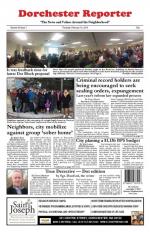October 30, 2014
Fulfilling a promise he made on May 22 after members of the Boston Taxi Drivers Association staged a protest near South Station, Mayor Walsh has appointed a committee to address mounting problems in the industry.
The Mayor’s Taxi Advisory Committee involves every government agency concerned with transportation in the city, from the Visitor’s Bureau to the Hackney Carriage Unit of the Police Department. It includes representatives of the radio associations, large fleet owners, owners of individual medallions, shift drivers, and the ride-sourcing services UberX and Lyft that allow customers to order and pay for a ride on a smart phone. There are 24 people in all serving on the commission.
“We tried to capture the widest net possible,” said committee chairman Christopher English, a policy analyst in the Mayor’s intergovernmental relations department and a Dorchester native. English served as the liaison to Dorchester’s district three in the latter years of the Menino administration.
“If you need to travel from one place to another in the city, at some point you are going to need the transportation for hire modality,” said English. “We want to make sure that when the need arises, that form of transportation is safe and available to everyone, regardless of where they live.”
The committee met for the first time earlier this month. It has posted a survey on the city’s website, seeking to find out more about how residents use taxis and the newer ride-sourcing services: How often do people use them? Why? Is the service reliable?
Residents can fill out the survey online at cityofboston.gov/intergovernmental/taxi. If they prefer to do it on paper, they can do it at the City Hall To Go Truck. The truck also provides iPads residents can use to do the survey online. All 24 members of the committee have a link to the survey as well.
“We really want public input,” said English. The committee also plans to hold community meetings. “We want to make sure we are listening to people from all different neighborhoods to get a sense of where we need to increase service.”
He sees two sets of issues. One is internal to the existing hackney industry, where there are lawsuits between drivers, owners and regulators. The other connects to ride-sourcing services. “We’re looking at both areas regarding equity, access and safety,” said English.
Committee members voice different perspectives. According to Donna Shaw, who represents the drivers’ union on the committee, the explosive growth of unregulated ride-sourcing services threatens the livelihood of drivers in the highly regulated taxi industry. In both arenas, drivers work as independent contractors. To operate a cab in Boston requires a medallion, which drivers lease from the owner for $100 or more per shift. The driver keeps the fares and tips. But after a driver pays for gas, insurance, tolls and radio dispatch, a very small margin remains. If business drops off, the driver is in the red.
And business has dropped 40 percent since Uber and Lyft came on the scene, according to drivers and owners. Drivers who go to work for UberX or Lyft do not have to pay a lease, Shaw said, but they are still independent contractors. Their earnings come from fares and tips. If the company decides to lower its prices to attract more customers, the drivers make less. There is no job security.
But according to Meghan Joyce, general manager of Uber Boston, ride sourcing technology benefits drivers as well as riders. Drivers like the flexible hours they get with Uber, she said. Most are part-time. As with Lyft, UberX drivers use their own vehicles. “The software is programmed to connect the rider’s request with the closest driver,” said Joyce. “So when drivers decide to turn on the software and start driving, they can do so in their own driveways.” This technological edge may also help Uber achieve shorter response times in Dorchester, according to Joyce, who represents Uber on the committee.
Because there is an electronic record of everything and no cash to rob, both drivers and passengers feel safe with ride sourcing. But driver background checks and insurance are not currently regulated as they are in the traditional taxi industry.
“Insurance safety for drivers and passengers will be one of our main themes,” said English. He is looking at other cities, including Chicago, Minneapolis and Houston, for ideas on how to regulate ride sourcing services equitably.
The committee is meeting every three weeks. They realize the safety and livelihood of many people are at stake. Increasing service to outlying areas remains a tough issue. “We’re collaborating to figure that out,” said English.



